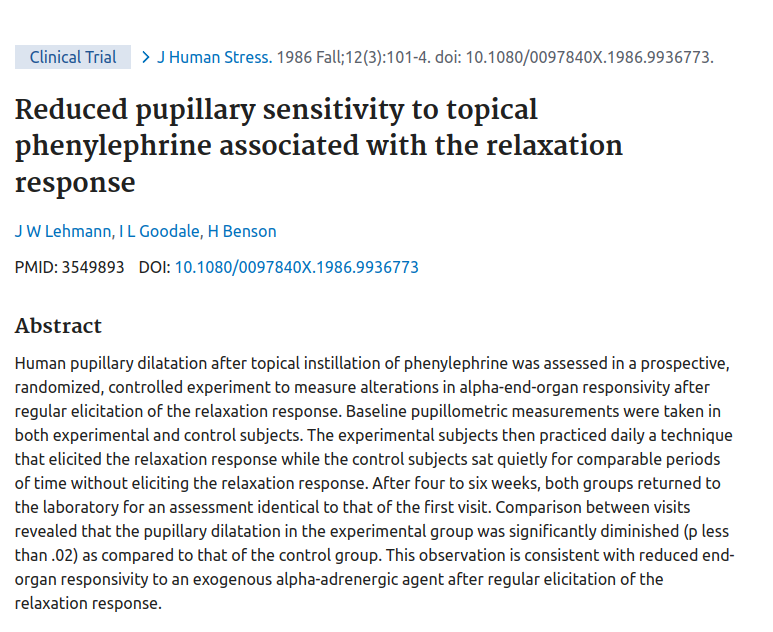Human pupillary dilatation after topical instillation of phenylephrine was assessed in a prospective, randomized, controlled experiment to measure alterations in α-end-organ responsivity after regular elicitation of the relaxation response. Baseline pupillometric measurements were taken in both experimental and control subjects. The experimental subjects then practiced daily a technique that elicited the relaxation response while the control subjects sat quietly for comparable periods of time without eliciting the relaxation response. After four to six weeks, both groups returned to the laboratory for an assessment identical to that of the first visit. Comparison between visits revealed that the pupillary dilatation in the experimental group was significantly diminished (p < .02) as compared to that of the control group. This observation is consistent with reduced end-organ responsivity to an exogenous α-adrenergic agent after regular elicitation of the relaxation response.
Reduced Pupillary Sensitivity to Topical Phenylephrine Associated with the Relaxation Response
Publication
Journal of Human Stress
Abstract
Web and Email Links
Related Listings
Journal
Journal of Research and Development in Education
Evaluated self-esteem and locus of control in a group of high school students prior to, during, and following a single academic year. Using a randomized, crossover experimental design, 26 Ss were exposed to either a health curriculum based on elicitation of the relaxation response (RLR) and then a follow-up period, while 24 were assigned to a control health curriculum and then the RLR. Psychological testing was conducted using the Piers-Harris Children's Self Concept Scale and the Now […]
Journal
Radiology
Immediately before they underwent femoral angiography, 45 patients were given one of three types of audiotapes: a relaxation response tape recorded for this study, a tape of contemporary instrumental music, or a blank tape. All patients were instructed to listen to their audiotape during the entire angiographic procedure. Each audiotape was played through earphones. Radiologists were not told the group assignment or tape contents. The patients given the audiotape with instructions to […]
Journal
The Lancet
A wakeful hypometabolic state may be induced by simple, non-cultic mental techniques or by traditional meditational practices. The hypometabolic state seems to represent an integrated hypothalamic response ("relaxation response") which is consistent with a state of decreased sympathetic-nervous-system activity. A prospective investigation was designed to test whether regular elicitation of the relaxation response might lower blood-pressures in hypertensive patients who were maintained […]

